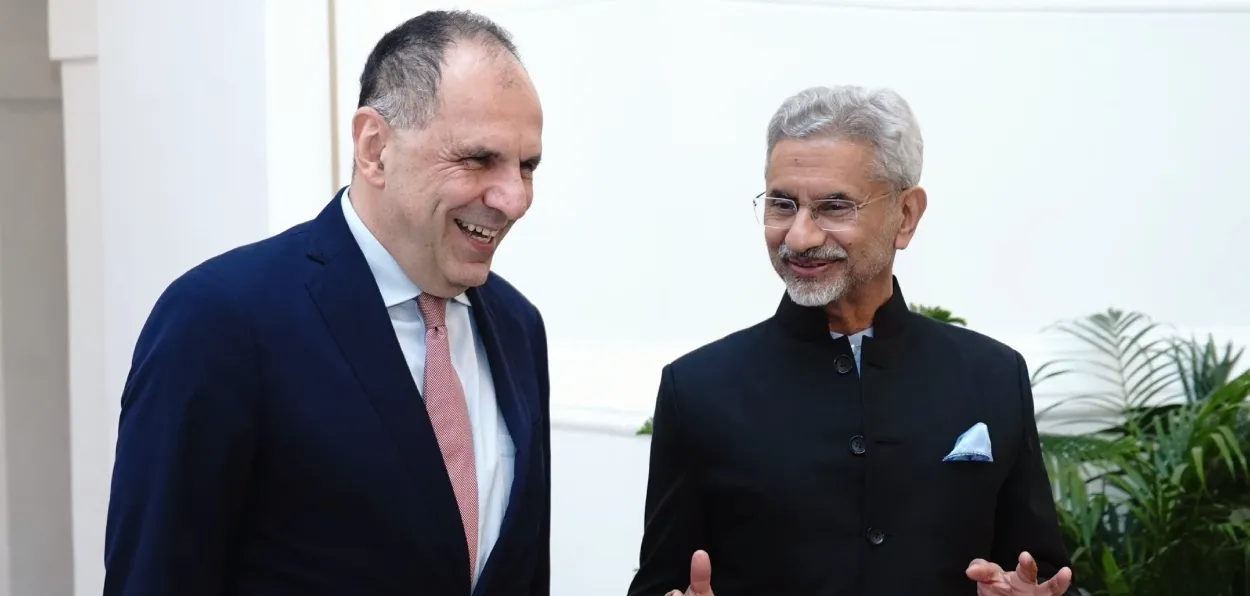
Aditi Bhaduri
While the visit of Prime Minister Narendra Modi to the USA and his meeting with President Donald Trump hogged the limelight the visit of George Gerapetritis, the Minister of Foreign Affairs of Greece to India from 5-7 February was equally significant.
Geo-Politics
India and Greece are old civilizational states which have been dialoguing with each other for centuries. That the visit happened in a year when both would mark the 75th Anniversary of their diplomatic relations is significant. Besides, the visit also reflects the recent dynamism of this bilateral relationship.
A year ago, Greek Prime Minister Kyriakos Mitsotakis visited India after a gap of 16 years. A year before that Modi visited Greece in August 2023 and became the first Indian Prime Minister in 40 years to do so. During that visit, bilateral ties were elevated to strategic ones; Trade, connectivity, and defense ties underpin this partnership.
The joint statement released during Gerapetritis' visit says "The Ministers recalled the directions of the two Prime Ministers to underpin the strategic partnership with a strong economic relationship and to double the volume of bilateral trade by 2030....... The Ministers expressed satisfaction at the progress achieved under the framework of defense cooperation."
Gerapetritis and Minister of External Affairs Dr. S. Jaishankar also exchanged views on regional and global developments, including those in the Indo-Pacific and the East Mediterranean regions. They declared their common stand on the India Middle-East Europe Economic Corridor further strengthening connectivity.
This engagement is part of India's more recent Mediterranean outreach, and is, in part, its response to Turkish hostility, and, the latter's support of Pakistan on Kashmir. India and Greece have difficult neighborhoods - India with Pakistan and Greece with Turkey.
Delegation-level talks between India and Greece Foreign Ministers in New Delhi
Looking back interesting things seem to be happening in this relationship and not all could be coincident. In 2019, Modi met his Greek counterpart on the sidelines of the UN General Assembly in New York. It came at a time that Turkish President Recep Tayyip Erdogan raked up Kashmir following India’s rescinding of the state’s special status and its bifurcation.
Turkey was soon hosting Kashmiri dissidents and allowing anti-India activities on its soil. Since then, Modi and Jaishankar have regularly met with their counterparts from Greece and Cyprus.
Greece has been Turkey's traditional rival. The two countries share a disputed maritime boundary and ties are also strained over the Turkish occupation of Northern Cyprus. In a move that finds parallel with Pakistan’s invasion of Kashmir in 1947, Turkey invaded Cyprus in 1974 and has since been insisting on the country’s partition to carve out a separate Turkish Republic of Northern Cyprus (TRNC).
Cyprus rejects this and Turkey is the only country to recognise TRNC pushing for its recognition by fellow Turkic states.
Incidentally, around the same time as Gerapetritis' India visit, Turkiye's President Erdogan was visiting Pakistan, where amongst other things, Pakistan pledged support to Turkiye's position on Northern Cyprus!
Thus, both India and Greece have common concerns regarding border conflicts, terrorism, and maritime threats. They support a free, open, and rule-based Mediterranean Sea and Indo-Pacific, by the provisions of the UNCLOS, and with full respect for the sovereignty, territorial integrity, and freedom of navigation of all.
The joint statement said, “The Ministers reaffirmed their commitment to international law, especially the United Nations Convention on the Law of the Sea (UNCLOS) and respect for sovereignty, territorial integrity, and freedom of navigation for maritime security and international peace and stability."
Both countries have participated in joint military exercises and India seeks to solicit Greece's know-how in defence production.
Greece is also pitching itself as India's gateway to Europe. Last year, on his visit to India, ahead of Mitsotakis visit, Gerapetritis said at the 2nd CII India-Europe Business and Sustainability Conclave in New Delhi that Greece hoped to become an integral part of the India-Middle East-Europe Economic Corridor (IMEC) and India’s gateway to the European Union.
The IMEC, according to the Minister, will “enhance the strategic importance of the regions involved, both economically and from a geopolitical aspect, while promoting peace and stability.”
Launched during the Delhi G20 meet in September 2023, the IMEC is also slated to cut down freight and transportation costs, boost the economies of the participating states, and counter China's Belt and Road Initiative. The IMEC, which was put on the back burner as the Israel-HAMAS war broke out in October 2023, received a boost when President Donald Trump in the presence of PM Modi mentioned that a major trade Corridor connecting India, Israel, Italy, and the United States, would soon be launched.
Thus Greece offers India a gateway to Europe, even as India negotiates a free trade agreement with the EU. Even if IMEC takes time to launch, Greece can still be accessed via the Black Sea ports through the western route of the International North-South Transport Corridor through Iran, Armenia, and Georgia.
ALSO READ: Kazakhstan with its openness, growth story is for India to befriend
Last year during a joint press conference Prime Minister Modi said "As two ancient and great civilizations, India and Greece have a long history of deep cultural and people-to-people ties. For almost two and a half thousand years, people of both countries have been exchanging trade and cultural relations as well as ideas." The visit of Gerapetritis reflects the continuation of this dialogue.
